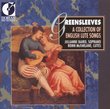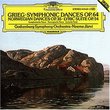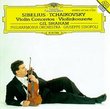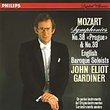| All Artists: John Foulds, Sakari Oramo, Susan Bickley, City of Birmingham Symphony Orchestra Title: John Foulds: Three Mantras Members Wishing: 0 Total Copies: 0 Label: Warner Classics Release Date: 1/25/2005 Genres: Pop, Classical Styles: Vocal Pop, Forms & Genres, Concertos, Symphonies Number of Discs: 1 SwapaCD Credits: 1 UPC: 825646152520 |
Search - John Foulds, Sakari Oramo, Susan Bickley :: John Foulds: Three Mantras
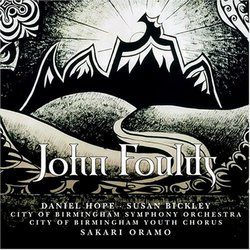 | John Foulds, Sakari Oramo, Susan Bickley John Foulds: Three Mantras Genres: Pop, Classical
|
Larger Image |
CD DetailsSimilar CDs
Similarly Requested CDs |
CD ReviewsA Relatively Unknown British Composer: Some Thoughtful Insig Grady Harp | Los Angeles, CA United States | 05/26/2006 (4 out of 5 stars) "John Foulds is not a name that leaps to the top of lists of even the more inquisitive surveyors of British music, but taking the time to listen carefully to his compositions as excerpted on this well-recorded CD gives notice of another influence on the now ubiquitous groups of composers devoted to the influence of Eastern music on Western compositions. Britten did it with his gamelan-inspired works (even including his final 'Death in Venice') while other composers still living (Arvo Part, Tan Dun, Unsuk Chin, Philip Glass, Andres Hillborg etc) continue to mine the sounds and techniques of reproduction on old instruments and melodies. Foulds, while not a great composer, did do is part in influencing the trend in his time. Of the works here recorded the 'Three Mantras' from 'Avatara' (his abandoned Sanskrit opera) show a gift for orchestration that rivals Strauss. His 'Lyra Celtica, concerto for voice & orchestra is well performed Susan Bickley in an extended wordless vocalise. His 'Apotheosis (Elegy), for violin & orchestra is likewise performed with great dignity by the gifted violinist Daniel Hope. And the collection concludes with the huge 'music poem' Mirage, for orchestra. For a composer who died in 1939 his music is quite progressive and deserves more exposure. Sakari Oramo conducts the Birmingham Symphony Orchestra in a committed fashion, obviously with deep respect for a composer who is all but unknown today. This is a far more interesting CD than is being credited, and for those who are eager to know more about 20th century composers who have been neglected, this is a fine selection to try. Grady Harp, May 06 " Ignore the other reviews Douglas M. May | 09/06/2006 (5 out of 5 stars) "Finding fault with this music because it fails to accurately incarnate the devices of an exotic musical culture completely misses the point. If this is musical kitsch, then so is The Dance of the Seven Veils and Mahler's employment of Chinese pentatonic scales in Das Lied Von Der Erde, not to mention such distant antecedents as the Alla Turca movement from the Mozart A Major variation sonata. In each case, the music should be judged for what it is and not as a failed attempt at ethnomusicological reconstruction. Secondly, how could anyone compare this with contemporary New Age music when it obviously eschews the repetitive harmonic devices of trance music and demonstrates a modulatory dynamism typical of turn-of-the-century composers? And finally, if you're going to hold a Victorian composer responsible for 1980s soundtracks, then why not pillory Mahler for having given birth to Max Steiner? I first heard Foulds' music 20 years ago on a Pearl recording of the Quartetto Intimo by the Endellion Quartet, and I was enthralled by the sheer technical finish of the music and the composer's investigation of such esoteric devices as quarter-tones in an enriched diatonic context. His is an original voice, although it is an eclectic originality that doesn't hit you over the head with the sheer invention of a Janacek or Stravinsky. Nevertheless, anyone who enjoys British music of the 20's and 30's will probably find something to admire here. Foulds may not "sound" exotic in the Three Mantras but his use of microtones, Eastern scales, polyrhythms and even metrical modulation (in the first Mantra)is in fact quite forward-looking. Certainly there is nothing in Vaughan Williams, Walton or Bax that resembles it. The other pieces are just as beautifully scored, but not as inventive in their musical content. The Apotheosis comes right out of the world of the Dvorak romances. The Lyra Keltica (NOT the Keltic Lament) seems to invoke the vocalise passages in the VW Pastoral Symphony and ends in an absolutely rapt coda in which the vocalist stretches her wordless cantilena around whole tones, microtones and quarter-tones (Susan Bickley does it effortlessly). "Mirage" is the most derivatively Straussian, but certainly is beautifully scored and contains many inspired passages of woodwind writing. Although there are passing references to Strauss and Scriabin, the cooler flames of Elgar, Bax, Bridge and Howells are much in evidence. I also hear Pingoud, Raitio and Merikanto in some of Foulds' orchestral textures, and it is probably no coincidence that a Finnish conductor, Sakari Oramo, has produced the best recordings to date of Foulds' music--with apologies to the old Barry Wordsworth LPO performances on Lyrita. Demonstration-class sound and highly recommended. " Romantic Masterpieces D. A Wend | Buffalo Grove, IL USA | 10/31/2006 (5 out of 5 stars) "I got to know John Foulds music through the second CD that was recorded by the CBSO and Sakari Oramo, which led me to get the first. John Foulds was an accomplished and remarkable man whose music - it surprises me - has been unjustly forgotten. The earliest work on this disc, from 1909, is the fourth music-poem Apotheosis, an elegy for orchestra and violin dedicated to the memory of Joseph Joachim. Cast in a single movement, the music is divided into five stanzas and contains allusions to the violin concertos of Beethoven and Brahms. The music begins with a funeral march that is heard again later in the work.
The fifth Music-Poem Mirage was completed in 1910 and is scored for a large orchestra and has six sections which were given titles indicating the philosophical program of the music such as "Immutable Nature" and "Man's ever-ambition." Oddly, the music was rehearsed by the Halle Orchestra but never was played during Fold's lifetime. The music is passionately Romantic with illusions to Wagner and Richard Strauss. A work that aimed at a wider audience was the Lyra Celtica (Celtic Lyre) - a concerto for voice and orchestra. It is an unfinished work with two complete movements with a third partially completed. It is a beautiful and mysterious piece but will not be to everyone's taste as the wordless voice is a work of this length (16:11) can become monotonous. The Three Mantras come from an abandoned Sandskrit opera called Avatara which was written during the 1920s. The Three Mantras are all of the music that survives from the opera and represents the preludes to each of the three acts and represent the action that will take place. The Mantras work well as concert works with Mantra I a highly energetic toccata representing the theme of activity followed by a movement representing bliss; a peaceful movement that includes a chorus of wordless women's voices. Mantra III, representing Will, returns to the shattering energy of the first movement. The movement contains Foulds' most complex and explosive music. The music is beautifully recorded and performed. If you like the music of Richard Strauss and Gustav Mahler and do not know John Foulds you will probably be pleasantly surprised. " |

 Track Listings (15) - Disc #1
Track Listings (15) - Disc #1
